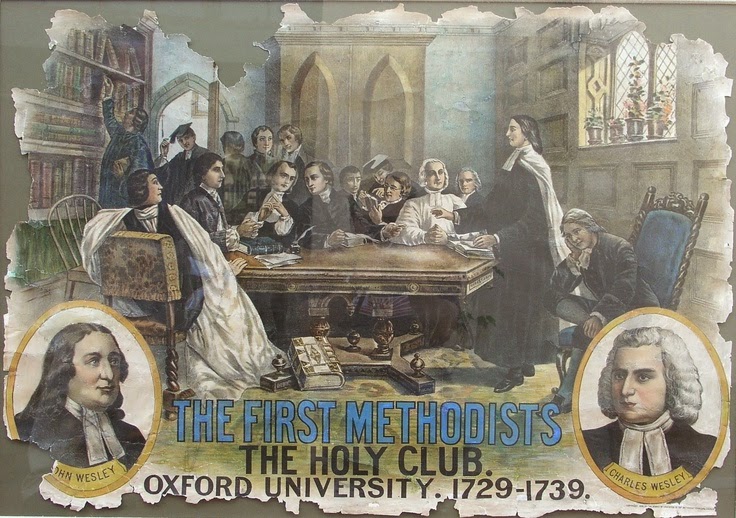Better Than
Just a few weeks ago, a friend and I were talking about John Wesley and his work with small accountability groups from early on in his life. He helped me remember how Wesley had put together 22 questions that were designed to probe the depths of his small group's Christian practice. I had read and studied those questions in seminary, but had forgotten about them until this conversation. Just a week or so later, someone else mentioned Wesley's questions at a session of Annual Conference. Never one to miss a subtle hint, I began to think about exploring those questions for the twenty-first century, and Wesley's birthday (today) seems the perfect time to start!
In 1792, while Wesley was a student at Oxford, he began what came to be known as "The Holy Club," a group of like-minded individuals serious about living the Christian life. Now, scholars can debate as to what the state of Wesley's Christian faith was at this point in his life, but nevertheless, this was the beginning, the roots, of what became the Methodist movement. Wesley and his fellow collegians made a covenant together to examine themselves each and every day with twenty-two questions, the first of which is this:
In 1792, while Wesley was a student at Oxford, he began what came to be known as "The Holy Club," a group of like-minded individuals serious about living the Christian life. Now, scholars can debate as to what the state of Wesley's Christian faith was at this point in his life, but nevertheless, this was the beginning, the roots, of what became the Methodist movement. Wesley and his fellow collegians made a covenant together to examine themselves each and every day with twenty-two questions, the first of which is this:
Am I consciously or unconsciously creating the impression that I am better than I really am? In other words, am I a hypocrite?
Now, that's quite a question to begin any inquiry with, because, in reality, the answer is always "yes." We're always hypocrites, because a hypocrite is someone who pretends to be someone other than what they are. The word comes from the Greek theater, where an "actor" (or "hypocrite") would put on a mask and take on another role.
We do that every day, in ways so subtle we may not even be aware of it. In the things we say and the things we do, we want others to like us and so we say things or agree with things or go along with things we may not agree with...just so we won't be left out, looked at strangely, or worse, ostracized. Or maybe it's in the things we don't say, the things we don't do, the things we don't object to. Do you remember that time when someone told a slightly off-color joke and you laughed along with it, even though it made you feel uncomfortable? Or the time when you didn't stand up for that person others were making fun of because they were different? I do. I remember those times vividly.
And then there's a part of our life Wesley never dreamed of: our online life. I know that I, over the last few years, have become very conscious of what I post online, on Facebook or Twitter or anywhere else, because so much can be misinterpreted and misused. You tend to be cautious of saying anything negative or sharing anything that shows weakness. And, regardless of what our teenagers think, once it's out there, it's "out there" for good. The online world is the ultimate place where we can pretend, where we can appear to be better than we are, where we can even imagine that we are someone else altogether.
It seems to me this question gets more to the heart of seeing ourselves as Jesus sees us. Or, more to the point, is who God made us to be enough? Are we content to be just who God made us to be and nothing more or less? When we are constantly pursuing another self, when we are trying to be "better than we really are" (to use Wesley's words), we have no time left to be who God made us to be. Perhaps this question has more to do with contentment than anything else. Are we content in who God made us to be?
Thank you, God, for making me who I am. Help me be content in that, and stop trying to impress other people by being someone I'm not. Allow me to know that you've already accepted me, welcomed me, and love me as I am, all the while calling me to be more like your son, Jesus. I place myself into your hands, accept your welcome, and know that's enough. Amen.



Comments
Post a Comment